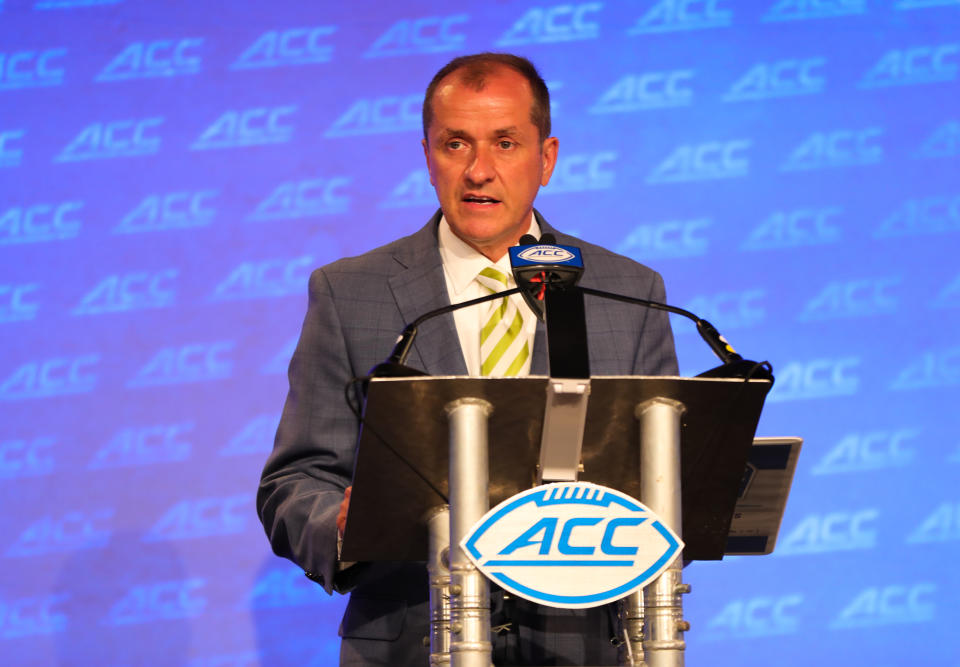ACC commissioner Jim Phillips acknowledged that he would be criticized for a lot of what he said Wednesday about the unsettled present and uncertain future of college football. So give him that. He knew he would sound Pollyannaish.
And, in further fairness, some of what he said wasn’t wrong.
It just probably isn’t right. At least not these days.
Phillips kicked off the ACC’s football media festivities with a stump speech and question-and-answer session that could have been delivered two generations ago.
He assailed the relentless pursuit of profits. He cautioned that every school and league needed to consider the greater good, not simply their own bottom line. He spoke up for non-revenue sports, smaller conferences and even the bowl industry.
He said hokey things like, “We owe it to those kids” when talking about the importance of athletics at places such as Northern Illinois, where he was once the athletic director.
“Any new structure of the NCAA must serve the many, not a collective few,” Phillips said. “We are not the professional ranks. This isn’t the NFL- or NBA-Lite. This shouldn’t be a winner-take-all or zero-sum structure. College sports have never been elitist or singularly commercial.”
In the past year the SEC and Big Ten have expanded their future ranks to 16, raided two conferences (Big 12 and Pac-12) for its biggest athletic brands and are poised to make $50 million, $60 million, maybe $80 million more per school than the ACC in media revenue alone.
They are being pushed by two dueling television behemoths (Fox and ESPN) who don’t see the establishment of an “NFL-Lite” as a bad thing considering the NFL itself is the biggest and most profitable entertainment property in the country.
“Singularly commercial” is today’s reality. Phillips talked about avoiding gated communities in college athletics while claiming the ACC is on the desired side of that gate.
He’s correct. It is … for now.
Check back in five years though.
“All neighborhoods need to be healthy,” Phillips said. “It’s not good for college athletics if they’re not. We understand where those two leagues are. No one is ignoring that. We’re all trying to find ways to close that gap.”


It’s not Phillips’ fault that the ACC is saddled with a disastrously long and comparatively revenue-poor media deal. He has been on the job just 18 months. His predecessor, John Swofford, negotiated that contract at the behest of school presidents who wanted extended calm (it runs through 2036) rather than constant risk and renegotiations.
The ACC doled out $35 million to $38 million per school in fiscal 2021 and that won’t change much over the next 14 years. The SEC and Big Ten, meanwhile, are projected to hit $100 million per school later this decade.
Exactly how long can you remain competitive when someone is doubling or tripling your revenue?
Maybe the only option for Phillips is to beg for mercy and harken back to a sepia-toned vision of what college athletics supposedly used to be. Student-athletes. Local competition. Shared values. All for one and one for all.
Except the ACC all but started this expansion craze two decades ago when it raided the old Big East for Boston College, Miami and Virginia Tech. Ten years later it finished the conference off by adding Louisville, Pitt and Syracuse.
And it was the ACC this year who voted against a 12-team playoff plan that included six automatic bids, which would have assured access and importance to football in the ACC, Big 12 and Pac-12, and at least one representative from the AAC or Mountain West or even Phillips’ old Mid-American Conference.
Nothing would have helped “all neighborhoods” like that playoff plan. It would have all but guaranteed that a future 12-1 Northern Illinois team would make the field — the way the Huskies reached a BCS Orange Bowl after a near-perfect 2012 season.
The ACC didn’t care and was a part of blocking it.
That was January. Now SEC commissioner Greg Sankey is theorizing that no automatic bids should be set aside in the future playoff, which may feature only eight teams (i.e. the majority of whom — surprise, surprise — will likely come from the SEC and Big Ten).
Now the ACC is trying to claim some moral high ground, as it sees its two chief competitors erecting a gated community inside the gated community? It is a bit hard to swallow.
Phillips is trying to wring every last drop of revenue out of every last stone he can find. He inherited this mess. A preseason talk is a preseason talk. Action is action.
And maybe he’s right and everyone can come together for the common good. It is certainly true that every league, including the Big Ten and SEC, will make more money by keeping college football as a national pursuit and not marginalizing large, proud and passionate fan bases from other conferences.
It’s just that there is no indication that such a thing will happen. Less than a year ago, the ACC joined a loosely aligned three-conference “Alliance” to further its goals. The Big Ten quickly turned traitor and gutted the Pac-12 anyway, an act of disloyalty the ACC apparently didn’t see coming.
That’s college sports in 2022. Everything is a knife fight, a chess move to gain power and money not just by improving your own fortunes but destabilizing and devaluing the competition as a media rights alternative.
Can the ACC fight that fight? Can it win that fight? Does it even appreciate that the fight is happening?
Well, it better. Because sticking up for the bowl industry or some mid-major volleyball program doesn’t seem like a winning path.
